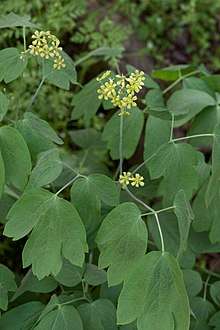Caulophyllum thalictroides
Caulophyllum thalictroides, the blue cohosh, a species of Caulophyllum (family Berberidaceae), also called squaw root or papoose root, is a flowering plant in the Berberidaceae (barberry) family. It is a medium-tall perennial with blue berry-like fruits and bluish-green foliage.
| Caulophyllum thalictroides | |
|---|---|
 | |
| Scientific classification | |
| Kingdom: | Plantae |
| Clade: | Tracheophytes |
| Clade: | Angiosperms |
| Clade: | Eudicots |
| Order: | Ranunculales |
| Family: | Berberidaceae |
| Genus: | Caulophyllum |
| Species: | C. thalictroides |
| Binomial name | |
| Caulophyllum thalictroides | |
Uses
Some bees visit the petals' nectar glands early in the season.[1]
The plant has been used as a medicinal herb by American Indians.[2] Many Native American tribes, and later European herbologists and mid-wives,[3] would use this herb in conjunction with other herbs and fluids for abortive and contraceptive purposes.[4]
The seeds have also reportedly been used a coffee substitute.[1]
Characteristics
From the single stalk rising from the ground, there is a single, large, three-branched leaf plus a fruiting stalk. The bluish-green leaflets are tulip-shaped, entire at the base, but serrate at the tip. Its species name, thalictroides, comes from the similarity between the large highly divided, multiple-compound leaves of meadow-rue (Thalictrum) and those of blue cohosh.
It is found in hardwood forest of the eastern United States, and favors moist coves and hillsides, generally in shady locations, in rich soil. It grows in eastern North America, from Manitoba and Oklahoma east to the Atlantic Ocean.
Gallery
- In bloom
 Foliage of plant in a Michigan deciduous forest
Foliage of plant in a Michigan deciduous forest
See also
- Black cohosh (Actaea racemosa), although similarly named, is actually a plant in a separate genus.
References
- Niering, William A.; Olmstead, Nancy C. (1985) [1979]. The Audubon Society Field Guide to North American Wildflowers, Eastern Region. Knopf. p. 416. ISBN 0-394-50432-1.
- Cichoke, Anthony J. (2001). Secrets of Native American herbal remedies: a comprehensive guide to the Native American tradition of using herbs and the mind/body/spirit connection for improving health and well-being. Penguin. pp. Blue Cohosh. ISBN 1-58333-100-X.
- Henriettesherbal. "Herbal Abortives and Birth Control". Henriettes-herb.com. Retrieved 24 February 2012.
- Sisterzeus. "Blue Cohosh". Sisterzeus.com. Retrieved 24 February 2012.
External links

| Wikimedia Commons has media related to Caulophyllum thalictroides. |